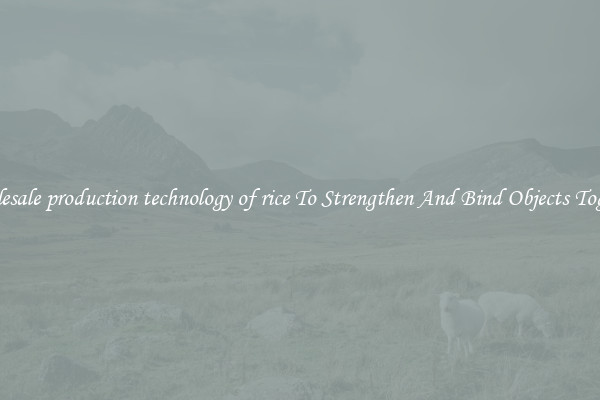Wholesale production technology of rice To Strengthen And Bind Objects Together
Wholesale production technology of rice: Strengthening and binding objects together

Rice is a widely consumed staple food across the globe. With its versatile uses and nutritional benefits, it has become an essential component of numerous dishes. However, rice is not solely limited to being a food source. Its grains possess a unique quality that allows them to strengthen and bind objects together. This innovative utilization of rice in wholesale production technology has proven to be effective in various industries.
One of the most significant applications of rice in wholesale production technology is in the manufacturing of adhesive products. Rice glue, also known as rice paste, is a traditional adhesive that has been used for centuries in different cultures. This natural glue is made by boiling rice grains until they become soft and then grinding them into a paste-like consistency. It is commonly used for bonding paper, fabric, wood, and even ceramics. The advantage of rice glue is that it is non-toxic, environmentally friendly, and can be easily washed off without leaving any residue.
In addition to adhesive production, rice is also utilized in the creation of composite materials. Researchers have discovered that by incorporating rice husks into plastic, they can develop a stronger and more durable material. Rice husk ash, a byproduct of rice milling, contains high levels of silica and cellulose, which add strength and flexibility to the composite. This technology has found applications in construction, automotive, and packaging industries. By using rice-based composites, manufacturers can reduce their reliance on non-renewable resources and contribute to a more sustainable future.
Furthermore, rice is also employed in the production of biodegradable packaging materials. Rice starch is extracted from rice grains and used as a raw material for creating films and coatings. These starch-based materials are ideal for food packaging, as they maintain the freshness and quality of the products, without leaving any harmful residues. Moreover, they decompose naturally, minimizing environmental impact and reducing waste accumulation.
The wholesale production technology of rice offers numerous advantages to various industries. Its natural adhesives, composite materials, and biodegradable packaging solutions provide sustainable alternatives to traditional manufacturing processes. Additionally, the use of rice in wholesale production technology aids in reducing carbon footprints, conserving resources, and promoting a greener future.
In conclusion, rice's extraordinary qualities go beyond its role as a staple food. The wholesale production technology of rice has opened up new avenues for utilizing this grain in adhesive production, composite materials, and biodegradable packaging. This innovative approach helps strengthen and bind objects together while also contributing to a more sustainable and environmentally friendly manufacturing industry.

View details

View details

View details

View details








